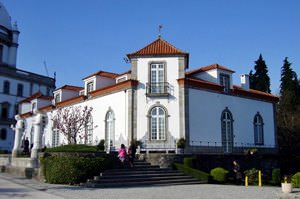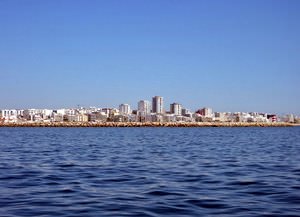
Portugal today is a republic with one official language, which is given the status of state language. We are talking about Portuguese. The last census showed that more than 200 million people in this world speak this language, thus, not only on the continent of Eurasia, but even in Africa and South America. According to its linguistic content, the Portuguese language is very similar to the Spanish language. Most likely this was due to the neighborship of Spain and Portugal. In this case, linguists consider both of the languages as the Ibero-Romance branch of the Romance languages. Grammar in these two linguistic directions is quite similar and implies the basic provisions created in the German and Arab tribes.
Portugal offers a wide range of entertainment for children of all ages. Adults are given the opportunity to take long walks and appreciate the …
Read further
Today, native Portuguese speakers mostly live in Brazil. If you look at history, this explanation looks quite consistent, because these territories were once the colonies of modern Portugal in South America. At the same time, experts note that the Portuguese language which is used exclusively in Portugal, that is the so-called European Portuguese language, differs to a large extent from the language used in Brazil. Grammar rules remain the same and classical language differs only a little. However, phonetics and language vocabulary were developing in absolutely different directions by these two nations during their independence. The Portuguese language was born on the territory of the country, thanks to the first inhabitants of the territories. The Iberian Peninsula was inhabited by the Iberians, whose dialect became the constructive basis for the creation of Portuguese.
Over time, the Roman conquerors brought the Latin alphabet, as well as some Romanesco dialects to Portugal. And after the Romans succeeded the Moors, the active formation of the vocabulary of the Portuguese language began. Historically, it was proven that the first document in this language was compiled by King Afonso II. However, literature researchers consider the end of the 12th century as the heyday of the Portuguese classical language. It was during this period that the tales of the famous troubadours appeared, stories about which are still very popular around the world. Literary men often consider classical Portuguese language as being twee and extremely concordant. Copyright www.orangesmile.com
Holidays in Portugal involves not only enjoying the sandy beaches and the beauty of nature, but also profitable shopping in modern, well-equipped …
Read further
In addition, Miranda was given the status of the official language on the territory of Portugal. The language is used in Miranda do Douro as the name implies. Despite the spread of the state language in Portugal, the local population speaks other European languages quite well, particularly English, French and Spanish. Portugal is considered a secular country and the church is completely separated from the state. The Constitution of the country guarantees the right to freedom of choice of religious confession or cult. In addition, the Constitution assures freedom of preaching and prohibits any discrimination on religious grounds for citizens of the country.
![Vilamoura Vilamoura]()
Nevertheless, Portugal has a relative religious unity. According to different statistics, in the territory of Portugal lives 90-93% of Christians from the total number of the population. This religious domination originated in the country during the second century. At that time, the country was conquered by the Roman Empire, which actively preached Christianity and tried to convert inhabitants of all its territories to the religion. Already at the beginning of the 8th century, Catholicism was fully established on the territory of the Iberian Peninsula. In the beginning and the end of the 13th century, the first Portuguese Patriarch of Rome, Pope John XXI, was elected. Almost all Catholics of the country adhere to the so-called Latin rite.
The luxury hotels in Portugal, deserving attention of the most discerning traveler.
Read further
The northern cities of Portugal are characterized by the greatest religiousness. There are quite a lot of religious buildings here, and residents often visit churches and temples. In addition, about 1% of Muslims live in the country. Islam in Portugal is met mainly in small regions of the country. It came to the Iberian Peninsula in the early 8th century, during the years of the Caliphate of Córdoba. To date, there are about 5,000 Muslims and most of them are not indigenous Portuguese, but are considered to have come from African countries. In the capital, there are large Jewish communities, which today amount to more than 200 thousand people. The appearance of Jews in the territory of Portugal dates back to the first century of our era. Less than 5% of the population consider themselves atheists and do not believe in the existence of higher power.
 Portugal today is a republic with one official language, which is given the status of state language. We are talking about Portuguese. The last census showed that more than 200 million people in this world speak this language, thus, not only on the continent of Eurasia, but even in Africa and South America. According to its linguistic content, the Portuguese language is very similar to the Spanish language. Most likely this was due to the neighborship of Spain and Portugal. In this case, linguists consider both of the languages as the Ibero-Romance branch of the Romance languages. Grammar in these two linguistic directions is quite similar and implies the basic provisions created in the German and Arab tribes.
Portugal today is a republic with one official language, which is given the status of state language. We are talking about Portuguese. The last census showed that more than 200 million people in this world speak this language, thus, not only on the continent of Eurasia, but even in Africa and South America. According to its linguistic content, the Portuguese language is very similar to the Spanish language. Most likely this was due to the neighborship of Spain and Portugal. In this case, linguists consider both of the languages as the Ibero-Romance branch of the Romance languages. Grammar in these two linguistic directions is quite similar and implies the basic provisions created in the German and Arab tribes.
 Nevertheless, Portugal has a relative religious unity. According to different statistics, in the territory of Portugal lives 90-93% of Christians from the total number of the population. This religious domination originated in the country during the second century. At that time, the country was conquered by the Roman Empire, which actively preached Christianity and tried to convert inhabitants of all its territories to the religion. Already at the beginning of the 8th century, Catholicism was fully established on the territory of the Iberian Peninsula. In the beginning and the end of the 13th century, the first Portuguese Patriarch of Rome, Pope John XXI, was elected. Almost all Catholics of the country adhere to the so-called Latin rite.
Nevertheless, Portugal has a relative religious unity. According to different statistics, in the territory of Portugal lives 90-93% of Christians from the total number of the population. This religious domination originated in the country during the second century. At that time, the country was conquered by the Roman Empire, which actively preached Christianity and tried to convert inhabitants of all its territories to the religion. Already at the beginning of the 8th century, Catholicism was fully established on the territory of the Iberian Peninsula. In the beginning and the end of the 13th century, the first Portuguese Patriarch of Rome, Pope John XXI, was elected. Almost all Catholics of the country adhere to the so-called Latin rite.



